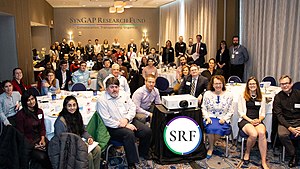Syngap Research Fund
| Abbreviation | SRF |
|---|---|
| Motto | Collaboration. Transparency. Urgency. |
| Formation | 2018 |
| Founder | Mike Graglia Ashley Evans |
| Founded at | Palo Alto, California |
| Website | syngapresearchfund |
The Syngap Research Fund is a rare disease non-profit organization founded in 2018 and based in Palo Alto, California. Its mission is to improve the quality of life of SynGAP1-related intellectual disability patients through the research and development of treatments, therapies and support systems. The Syngap Research Fund is listed as a patient organization on the National Organization of Rare Disorder’s (NORD) database and on the National Institutes of Health's Genetic and Rare Diseases Information Center.[1][2] The organization has issued more than $1,000,000 in grants and hosts an annual meeting prior to the American Epilepsy Society conference. It has advocated in favor of personalized medicine in front of the Congressional Personalized Medicine Caucus.
History[edit]
The Syngap Research Fund was founded in 2018 with the primary purpose of supporting research focused on gene therapies for SynGAP patients.[3] It was established in the state of California and was designated a tax-exempt public charity in the United States by the Internal Revenue Service under Section 501(c)3.
Programs[edit]
The Syngap Research Fund provides grants to research institutions where the Principle Investigator has knowledge of SynGAP and/or key skills essential for developing therapies for SynGAP patients. It also collaborates as a funding partner with the American Epilepsy Society as part of its Seed Grant program.[4]
Grants[edit]
The Syngap Research Fund has issued more than $1,000,000 in grants to the following researchers:[5]
- Dr Gavin Rumbaugh at Scripps Research to test the hypothesis that the pathogenicity of distinct SYNGAP1 variants found in patients will correlate with the extent of dysfunction in neurons derived from their own cells.[6]
- Dr Jimmy Lloyd Holder at Baylor College of Medicine to develop and characterize induced pluripotent stem cell (iPSC) lines to support the research at Scripps.[6]
- Dr Richard L .Huganir at the Johns Hopkins School of Medicine to research SynGAP animal models and to explore naturally occurring antisense oligonucleotides that relate to SynGAP.[7]
- Dr Daniel Lowenstein at University of California San Francisco to support the 2019 Precision Medicine for Epilepsy Conference.[8]
- Dr Marcelo Pablo Coba and Dr Giorgia Quadrato at the University of Southern California to support the purchase of a Willow MEA system to enhance research into SynGAP organoids.[9]
- Elizabeth Heller, PhD at University of Pennsylvania's Epigenetic Center to develop a rich body of knowledge around the epigenetics of SYNGAP1.[10]
- Thomas Frazier, PhD at John Carrol University for the development and validation of a Neurobehavioral Evaluation Tool.[11]
Research Roundtable[edit]

The Syngap Research Fund hosts an annual meeting prior to the American Epilepsy Society conference. Researchers, scientists and clinicians are invited to speak and learn about the current state of Syngap research. The first roundtable was held in 2019 in Baltimore, Maryland.[12]
Advocacy[edit]
The Syngap Research Fund has advocated in favor of personalized medicine in front of the Congressional Personalized Medicine Caucus.[13] It has also advocated for the creation of an ICD-10 classification for SYNGAP1-related intellectual disability.[14]
Partner Organizations[edit]
The Syngap Research Fund partners with the following rare disease and SynGAP organizations:
- Global Genes
- Combined Brain
- Epilepsy Leadership Council[15]
- Personalized Medicine Coalition[16]
- AGENDA
- Simons Searchlight
- CALRARE
- Syngap Global Network
- Overcôme Syngap1
- SYNGAP Elternhilfe
- Syngap1.ch
- SynGAP Research Fund Australia
- Leon & Friends
See also[edit]
References[edit]
- ↑ "Syngap Research Fund". NORD (National Organization for Rare Disorders). Retrieved 2020-07-05.
- ↑ "SynGAP Research Fund". Genetic and Rare Diseases Information Center. Retrieved July 6, 2020. Unknown parameter
|url-status=ignored (help) - ↑ "J. Michael Graglia, 2001. Managing Director & Co-Founder, SynGAP Research Fund (SRF)". The Paul & Daisy Soros Fellowships for New Americans. Retrieved July 6, 2020. Unknown parameter
|url-status=ignored (help) - ↑ DrupalAdmin (2013-12-04). "Seed Grant Program". American Epilepsy Society. Retrieved 2020-07-12.
- ↑ "Family groups, researchers join forces to solve mysteries of autism gene". Spectrum News. July 10, 2019. Retrieved July 6, 2020. Unknown parameter
|url-status=ignored (help) - ↑ 6.0 6.1 Llamosas, Nerea; Arora, Vineet; Vij, Ridhima; Kilinc, Murat; Bijoch, Lukasz; Rojas, Camilo; Reich, Adrian; Sridharan, BanuPriya; Willems, Erik; Piper, David R.; Scampavia, Louis (2020-06-03). "Human SYNGAP1 Regulates the Development of Neuronal Activity by Controlling Dendritic and Synaptic Maturation". bioRxiv 10.1101/2020.06.01.127613 Check
|biorxiv=value (help). - ↑ Araki, Yoichi; Hong, Ingie; Gamache, Timothy R; Ju, Shaowen; Collado-Torres, Leonardo; Shin, Joo Heon; Huganir, Richard L (2020-06-24). "SynGAP isoforms differentially regulate synaptic plasticity and dendritic development". eLife. 9: e56273. doi:10.7554/eLife.56273. ISSN 2050-084X. PMC 7314543 Check
|pmc=value (help). PMID 32579114 Check|pmid=value (help). - ↑ "Epilepsy Precision Medicine Conference". September 16, 2019. Retrieved July 5, 2020. Unknown parameter
|url-status=ignored (help) - ↑ "USC scientists use brain organoids to study intellectual disability, with support from the SynGAP Research Fund". USC Stem Cell. Retrieved 2020-07-06.
- ↑ "Elizabeth A Heller receives grant from SynGAP Research Fund". University of Pennsylvania. Unknown parameter
|url-status=ignored (help) - ↑ "Our Grants". SynGAP Research Fund. Unknown parameter
|url-status=ignored (help) - ↑ "Standing room only at SRF 1st Annual SynGAP Roundtable!". SynGap Research Fund, Inc. Retrieved 2020-07-12.
- ↑ "Briefing on Personalized Medicine". Federal Telemedicine News. March 9, 2020. Retrieved July 6, 2020. Unknown parameter
|url-status=ignored (help) - ↑ "ICD-10 Coordination and Maintenance Committee Meeting" (PDF). CDC. March 2020. Retrieved July 5, 2020. Unknown parameter
|url-status=ignored (help) - ↑ "Patient/Family Organizations". American Epilepsy Society. Retrieved July 6, 2020. Unknown parameter
|url-status=ignored (help) - ↑ "PMC Membership" (PDF). Personalized Medicine Coalition. June 2020. Retrieved July 6, 2020. Unknown parameter
|url-status=ignored (help)
External links[edit]
This article "Syngap Research Fund" is from Wikipedia. The list of its authors can be seen in its historical and/or the page Edithistory:Syngap Research Fund. Articles copied from Draft Namespace on Wikipedia could be seen on the Draft Namespace of Wikipedia and not main one.
